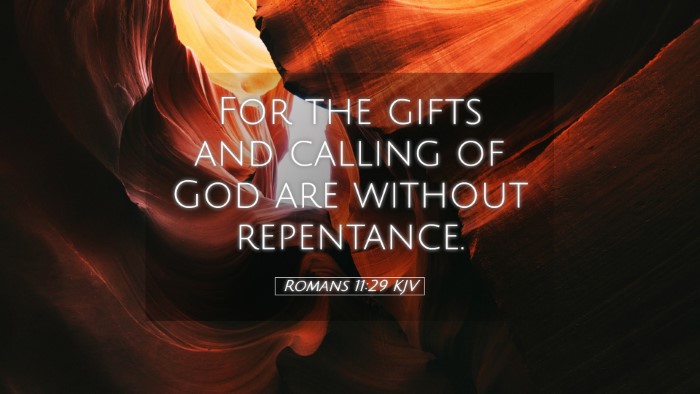Commentary on Romans 11:29
Romans 11:29 states, "For the gifts and calling of God are without repentance." This verse serves as a profound declaration of God's unchanging nature in regard to His gifts and calling. It underscores deep theological truths about God's covenantal faithfulness and the permanence of His purpose.
Contextual Overview
In the broader context of Romans 11, the Apostle Paul is addressing the issue of Israel's rejection of the Gospel and God's continuing plan for His people. The tension between Israel's present state and God's promises is central to Paul's argument. This verse, therefore, acts as a crucial reminder of the unalterable nature of God's intentions.
Theological Implications
The theological implications of Romans 11:29 are multi-faceted. According to Matthew Henry, the gifts refer to God's benevolent acts and the spiritual blessings He bestows upon His people. These gifts can include the grace of salvation, the anointing of the Holy Spirit, and the calling to participate in His work on earth.
Henry elaborates that God's calling is also irrevocable; once He has chosen someone for His divine purpose, that calling stands firm. Albert Barnes concurs, adding that God's "gifts" and "calling" refer chiefly to the blessings that pertain to the covenant relationships, highlighting God's eternal commitments that transcend human actions or decisions.
Gifts and Calling as Manifestations of Grace
In Adam Clarke's commentary, he digs deeper into the distinctive nature of these gifts and calling. Clarke posits that these gifts may include both temporal and spiritual endowments, which are manifestations of God's grace to humanity. Such gifts are intrinsic to the character of God, who bestows them freely and without reservation.
Unchanging Nature of God
The assertion that these gifts and calling are "without repentance" indicates God's unchanging purpose. Matthew Henry emphasizes that God does not change His mind about the blessings He imparts. This speaks to the broader theme of God's fidelity and the assurance that believers can find in His eternal promises.
-
God's Faithfulness: God's promises are reliable. His purposes do not waver based on human circumstances or failures.
-
Irrevocability of the Calling: The divine calling issued to individuals and His people remains firm regardless of their unfaithfulness.
-
Encouragement for Believers: This verse serves as a source of comfort and encouragement, confirming that God’s blessings are not contingent on human stability.
Interpretive Considerations
When interpreting Romans 11:29, it is essential to consider its application to both individuals and the corporate body of believers. Paul underscores that this truth encompasses both the Gentile believers and Israel, indicating the comprehensive nature of God's grace.
The "gifts" may relate to spiritual endowments given within the church for the building up of the body, while the "calling" involves the higher purpose to which God has called each believer. Albert Barnes notes that this extends the promise of God’s faithfulness not just to the Jews but also to the Gentiles in the context of salvation history.
Conclusion
In conclusion, Romans 11:29 encapsulates God's unwavering commitment to His gifts and calling towards humanity. For pastors and theologians, this verse serves as a profound reminder of the hope and assurance found in God's eternal purposes. Students and scholars are invited to delve deeper into the implications of divine gifts and calling as inseparable from His nature.
Reflecting on this truth can foster a deeper appreciation of God's grace and inspire a steadfast commitment to respond to His calling. As Paul articulates, understanding God's intentions allows believers to live confidently within His plan and purpose.


